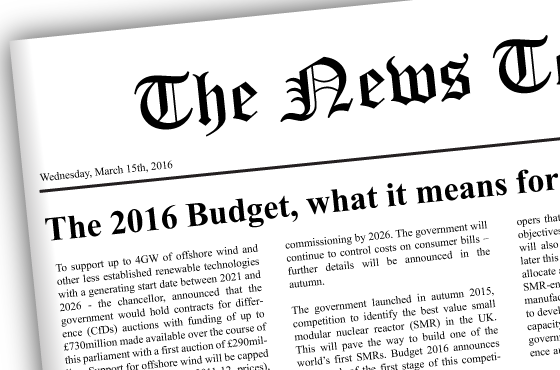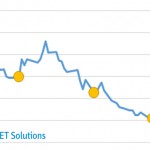News
Insight is power
2016 Budget – Electricity & Gas

George Osbourne has delivered the 2016 budget on 16th March
Key points of interest among the 2016 budget announcements are:
- The government will auction Contracts for Difference of up to £730 million this parliament for offshore wind and other less established renewable technologies.
- Abolish the Carbon Reduction Commitment (CRC) energy efficient scheme from the end of 2018/19
- Increase the main rates of Climate Change Levy (CCL) to cover the costs of CRC abolition
- The government will allocate at least £50 million for innovation in energy storage and other smart technologies over the next five years
- Tax cuts for the oil and gas industry as the supplementary charge on oil and gas is cut from 20% to 10%
- Ofgem’s E-serve functions will be split off from Ofgem so that the regulator can focus on its core functions.
2016 Budget announcements
The government has committed to meeting the UK’s ambitious environmental targets in a cost-effective way, ensuring value for money for the taxpayer and retaining protection for the smallest and most energy intensive businesses.
The budget announces the biggest energy tax reforms since the taxes were introduced and has committed to:
- abolish the CRC energy efficiency scheme (CRC) following the 2018-19 compliance year, ending a complex scheme with bureaucratic and costly administrative requirements. It will significantly streamline the business energy tax landscape by moving to a system where businesses are only charged one energy tax administered by suppliers rather than CRC participants being required to forecast energy use, buy and surrender allowances
- increase the Climate Change Levy (CCL) from 2019, to recover the revenue from abolishing the CRC in a fiscally-neutral reform, and incentivise energy efficiency among CCL-paying businesses
- rebalance CCL rates for different fuel types to reflect recent data on the fuel mix used in electricity generation, moving to a ratio of 2.5:1 (electricity, gas) from April 2019. In the longer term, the government intends to rebalance the rates further, reaching a ratio of 1:1 (electricity, gas) rates by 2025. This will more strongly incentivise reductions in the use of gas, in support of the UK’s climate change targets
- keep existing Climate Change Agreement (CCA) scheme eligibility criteria in place until at least 2023, ensuring energy intensive industries remain protected. From April 2019, the CCL discount available to CCA participants will increase so that they pay no more than an RPI increase. The government will ensure that these agreements deliver on their energy efficiency goals through a DECC-led target review starting in 2016
At Budget 2014 the government capped Carbon Price Support (CPS) rates at £18 t/CO2 from 2016-17 to 2019-20 to limit competitive disadvantage to British businesses. Due to the continued low price of the EU Emissions Trading System (EU ETS), the government is maintaining the cap on CPS rates at £18 t/CO2, uprating this with inflation in 2020‑21, in order to continue protecting businesses.
The government will set out the long-term direction for CPS rates and the Carbon Price Floor at Autumn Statement, taking into account the full range of factors affecting the energy market.
Support for oil & Gas
The government’s plan to ensure the fiscal regime supports the objective of maximising economic recovery whilst achieving economic recovery from the North Sea will be delivered by:
- effectively abolish Petroleum Revenue Tax by permanently reducing the rate from 35% to 0% to simplify the regime for investors and level the playing field between investment opportunities in older fields and infrastructure and new developments. The change will take effect from 1 January 2016
- reduce the Supplementary Charge from 20% to 10%, to send a strong signal that the UK is open for business and in recognition of the exceptionally challenging conditions that are currently facing the sector. The change will take effect from 1 January 2016
- provide a further £20 million of funding for a second round of seismic surveys in 2016‑17, as announced by the Prime Minister in January, to build on the success of the seismic programme in 2015 and encourage exploration in under-explored areas of the UKCS
- extend the Investment and Cluster Area Allowances to include tariff income, in order to encourage investment in key infrastructure maintained for the benefit of third parties
- provide certainty that companies will be able to access tax relief on their costs when they retain decommissioning liabilities for an asset after a sale, to encourage new entrants for late-life assets and the development of late-life business models
- build on the new decommissioning powers of the Oil and Gas Authority (OGA) by undertaking further work with the OGA and industry to reduce overall decommissioning costs, to deliver significant savings for industry and the Exchequer. If significant progress can be made, the government will explore whether decommissioning tax relief could better encourage transfers of late-life assets
The government has also announced it will consider proposals for using UK Guarantees Scheme for infrastructure where it could help secure new investment in assets of strategic importance to maximising economic recovery of oil and gas. Any proposals would meet the existing criteria of the scheme, including relation to commerciality & financial credibility.
Smart and low carbon energy technologies
To support up to 4GW of offshore wind and other less established renewable technologies with a generating start date between 2021 and 2026 – the chancellor, announced that the government would hold contracts for difference (CfDs) auctions with funding of up to £730million made available over the course of this parliament with a first auction of £290million. Support for offshore wind will be capped initially at £105/MWh (in 2011-12 prices), falling to £85/MWh for projects commissioning by 2026. The government will continue to control costs on consumer bills – further details will be announced in the autumn.
The government launched in autumn 2015, competition to identify the best value small modular nuclear reactor (SMR) in the UK. This will pave the way to build one of the world’s first SMRs. Budget 2016 announces the launch of the first stage of this competition, which will generate a list of SMR developers that could deliver on the government’s objectives. The government will also publish an SMR delivery roadmap later this year and will allocate at least £30 million for an SMR-enabling advanced manufacturing R&D programme to develop nuclear skills capacity.
The government will transfer the world’s largest wave energy testing facility (Wave Hub) to Cornwall Council and provide around £15 million to develop the facility as part of a new Marine Hub Enterprise Zone.
In the meantime the government has detailed the expected completion in 2018-19 of the Tees Renewable Energy Plant and the £190-200 million of energy works in Hull.
At least £50 million pounds worth of funding for energy storage, demand-side response and other smart technologies and business models over the next 5 years to help drive innovation. However, Ofgem will consult later this year on the future of the £100 million Network Innovation Competition to maximise the delivery of ‘genuinely innovative projects and technologies’.
The government will also increase its ambition for greater electricity interconnection by 80%, now supporting at least an additional 9GW of interconnection.
The government will consult later this year on the priorities and delivery models for the Shale Wealth Fund, and how it can be deployed in local communities and the North region. This fund could be worth up to £1 billion over 25 years and will provide additional funds over and above industry scheme.
Regulatory developments
The government is planning to streamline the regulatory system, especially Ofgem, by splitting the E-serve arm so that Ofgem can “focus on its core functions of economic regulation and promoting competition”.
The Department of Energy and Climate Change are committed to consolidating their delivery providers and will set out the future of consumer-facing functions, including those currently undertaken by E-Serve, at Autumn Statement 2016. The government will continue to consider whether economic regulators’ functions can be further streamlined
The government will also strengthen competition and innovation, including by legislating to give Ofgem more power to make sure the system of industry codes supports competition and by enhancing the role of the Competition and Markets Authority in the regulated sectors.
The will drive efficiency, by working with economic regulators to review the business case for co-locating and sharing back office functions across regulators, reporting by summer 2016.
Source: https://www.gov.uk/government/publications/budget-2016-documents







